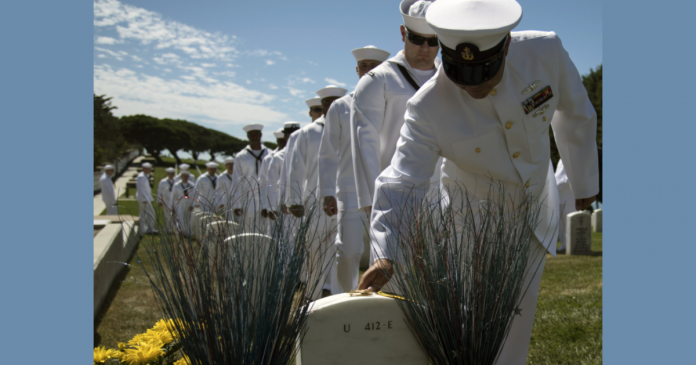
This story initially was released by Real Clear Wire
Real Clear Wire
In 2006, Navy SEAL Michael Monsoor, aged 25, offered his life for our nation.
The Medal of Honor citation explains how insurgents tossed a grenade onto the roof where the Americans were placed. There sufficed time for Michael to take a look at a colleague before he decided– to toss himself down, smother the blast, quit his own life so 2 others might live.
After the implementation, George Monsoor welcomed his kid’s colleagues to Thanksgiving supper. He listened to their stories; he desired the reality. He ‘d questioned the main story, understanding the armed force had actually finessed events of friendly fire or other wartime errors to produce a hero story rather. Whatever examined out– it took place simply as reported.
Michael had actually remained in Ramadi for 6 months, surrounded by his brothers-in-arms however cut off from his blood household. The last call he made to his moms and dads went to voicemail on George’s phone.
” Hello? Mommy? Papa? You’ll be sorry you missed me,” Michael stated into the recording.
Now, on a Memorial Day almost 20 years later on, I question how we ought to honor the memory of a guy who selected to crave his good friends and for his nation, instead of return home to his household.
After Hector is eliminated in Homer’s Iliad, his mom keeps in mind how he brought the Trojans “a lot splendor.” She disregards the truth that before his death Hector shivered in worry and ranged from Achilles, his opponent. She speaks just of the guy appreciated by all, choosing the brave variation to the reality. Hector’s spouse is ambivalent; she thinks about his magnificence, however likewise the shock of his unexpected lack from the world. “Hector, my life is over,” she sings in lamentation, anticipating the destroy his death will give her household and city.
George Monsoor’s response was more of a piece with Hector’s spouse than his mom.
” Our household is strong, however there’s vacuum,” George stated.
He discussed the vacations and household reunions his boy has actually missed out on in the years considering that his death.
” We’re still excellent, however there’s a space … something that’s not there.”
The nation acquired a hero, however for a daddy what remains is the lack.
” I’m still waiting to hear him.”
Today, little remains of that spontaneous act of nerve, as lovely as it was harmful. The wars ended. Regular life resumed. A brand-new generation of Americans got in the adult years without experiencing the injury of 9/11, without the obsession to protect their nation, to bet their lives on an objective ultimately deserted. I’m old adequate to bear in mind the sensation of uniformity caused by 9/11, how “the Nation” ended up being so genuine therefore immediate regarding motivate acts of nerve from common individuals.
But unlike the damage of Troy that followed Hector’s death, America flourished in the years following Iraq and Afghanistan. GDP has actually doubled because American soldiers combated in the streets of Ramadi. While ending up being more flourishing, nevertheless, Americans likewise have actually ended up being more narcissistic, more aimless in our pursuit of joy.
We listen to political leaders discuss the requirement of war however understand that really couple of have actually been formed by war, either personally or through an enjoyed one’s journey. We motivate individuals in Ukraine and Gaza to take possibilities we can’t think of taking ourselves. For Americans, war has actually ended up being primarily a phenomenon, a hazardous video game played by others in far locations.
In a culture where so couple of want to compromise, we forget that our nation’s story is composed by normal individuals who make a distinction in the lives of others, when making a distinction suggests life or death.
In among their last telephone discussions, Michael informed his daddy, “I’ll choose if I pass away over here.” Those with Michael on the roofing system that September day validated he looked his colleague in the eyes a minute before tossing himself at the ground. For anybody questioning just how much more he can provide or what distinction it might make, Michael’s brave spirit ripples forward through time, enlivening a power that beats inside the heart of every American.
John J. Waters is the author of the postwar book River City One(Simon and Schuster). He finished from the U.S. Naval Academy and worked as a Marine in Afghanistan and Iraq.
This short article was initially released by RealClearDefense and provided by means of RealClearWire.
The post Remembering a Death in Battle appeared initially on The Gateway Pundit
This article may have been paraphrased or summarized for brevity. The original article may be accessed here: Read Source Article.





![President Trump Gives Barron A Shout Out At Inaugural Parade: His Unexpected Response is Pure Gold! [VIDEO] president-trump-gives-barron-a-shout-out-at-inaugural-parade:-his-unexpected-response-is-pure-gold!-[video]](https://news.lateawakening.com/wp-content/uploads/2025/01/35545-president-trump-gives-barron-a-shout-out-at-inaugural-parade-his-unexpected-response-is-pure-gold-video-100x70.jpg)



